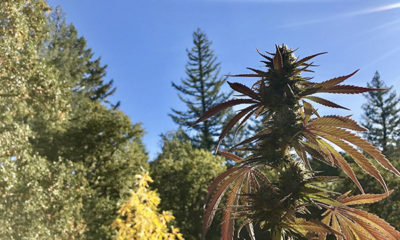
Joint Opinions
New Year’s Resolution: Fight Against the War on Drugs
Marijuana legalization is a small victory, a small step towards undoing the War on Drug’s legacy. If we stop here, it will be a failure.
For those of us old enough to remember the utility of carving makeshift bongs out of apples, the thrift of scraping months’ worth of resin out of glass pipes to cobble together enough THC to enjoy an afternoon buzz, and the necessity of slinking behind bushes and hurling ourselves over fences to elude punishment, the era of legal commercial marijuana sales is a wonderful thing.
Celebrate we should, for this — the privilege of handing a store clerk $70 plus taxes for an eighth of cannabis — is a significant milestone and a long time coming. It is also just the very beginning, a preamble, the end of the beginning.
For those who will listen, it’s a lesson and reminder. The drug war is far from over — and marijuana legalization has a long way to go before it’s “settled” in a way that brings about a lasting and just peace, rather than (like so many other “wars” that involve sieges and stalemates between nation-states) more conflict, on a different stage, with younger actors.
With all the baggage that decades of treating marijuana like a toxic substance brings, watching adults (21 and over) march into commercial storefronts and emerge with (small amounts) of cannabis is by itself an intoxicating sight.
Dumping the load of outright illegality at long last can lead to all kinds of heady and premature pronouncements, such as “We won!” and “The war’s over!” But don’t mistake the flush of a single victory for the final peace.
Real combat and conflict are present enough in our lives to render inappropriate war metaphors trite and offensive, but here is a rare exception. The drug war is a real war. This is not hyperbole. The drug war has soldiers, and they are armed with the same equipment and attitudes that American soldiers carry into combat zones. And most significantly, the drug war has casualties, most of whom (as with a war between opposing armies) are nonviolent noncombatants.
What’s the drug war good for? Plenty: Disenfranchising voters, impoverishing communities of people. Denying jobs, denying the welfare state’s last vestiges. The drug war denies people money. It strips people of their power, and concentrates it somewhere else.
War is politics by other means, as the military theorist Carl von Clausewitz said, and the forces behind these directives are alive and thriving in our society. They are in the White House. They are president and they are attorney general.
None of this has changed with marijuana legalization’s rapid, stunning success, and the head-spinning growth of the legal American cannabis industry. The laws creating a state of war are still on the books, and the warriors are still on the battlefield. And, yes, that applies to cannabis.
This year, resolve to carry this in your head and in your heart, and remind yourself and others:
- The Controlled Substances Act is still on the books. The United States of America still officially classifies cannabis as a dangerous substance, highly addictive, with no known medical application. (Like many other official conflicts, the drug war’s roots are in an untruth.)
- The U.S. government still punishes crack cocaine (and those who use and sell it) ten times more harshly than it does powder cocaine. That’s better than the 100-fold disparity that was true for much of our lives, but moving a gross injustice one decimal point is still a gross injustice. And we have an attorney general who thinks the Fair Sentencing Act is an aberration to be corrected.
- There are still thousands of men and women in prison and on parole for marijuana offenses. Some of them were denied clemency by President Barack Obama — meaning they will likely be there until there is a massive changeover of power in Washington, D.C. Keep John Knock and Luke Scarmazzo in your mind the next time you visit a dispensary.
- For many, the drug war is an extension of America’s longstanding campaign of marginalization against people of color. The country’s war on weed began as a method of demonizing Mexican laborers, then black artists and hippies. No serious person would believe that America’s deeply ingrained racism has gone away. Take a look around marijuana business conferences. Settle in and listen to entrepreneurs and investors talk about their grand plans for the industry — and remark upon their gender and complexion. The cannabis industry is a white man’s world. That itself should be troubling even without the added context of the War on Drugs’ victims.
Perhaps this bores you. Perhaps this feels like a killjoy’s hectoring, the unnecessary turd in an otherwise delightful punchbowl. But remember those who do not have the luxury of forgetting about the War on Drugs, because in reality, neither do you.
TELL US, what are you doing to end the War on Drugs?
























